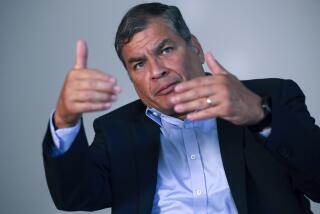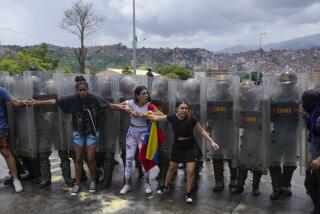Ecuador’s Military Says ‘Junta’ Is in Charge
SANTIAGO, Chile — Ecuador’s long-simmering political and economic troubles boiled over into crisis Friday as the military demanded the resignation of President Jamil Mahuad and declared a three-person “government junta” in charge. Mahuad vowed that he would remain in office but then took refuge at an air force base with his government apparently having collapsed.
Defense Minister Gen. Carlos Mendoza said late Friday that he would be joined by indigenous leader Antonio Vargas and former Supreme Court chief Carlos Solorzano in a three-member ruling council, according to news reports.
“It is a government of the Ecuadorean people,” Mendoza said. “We cannot speak of left or right.”
The political tumult took place hours after indigenous protesters seized the Congress building and, later, the presidential palace and other government buildings.
The leaders of the protesters and a group of insurgent midlevel army officers negotiated with top commanders for several hours before the announcement of the new government.
Although Mendoza announced at 6:45 p.m. that he had taken over the government, Mahuad asserted about three hours later through a spokesman that he had not ceded power. The spokesman, Interior Minister Vladimiro Alvarez, denied reports that the president had sought refuge in Chile or Costa Rica.
The crisis and ensuing confusion over who was in charge were sparked by the takeover Friday morning of the empty Congress building by indigenous protesters, at least 6,000 of whom have occupied the center of Quito, Ecuador’s capital, for the past week.
Ecuador’s indigenous people, who live in the hardscrabble Andean highlands, have long been ignored and neglected by the elites of Quito and bustling coastal Guayaquil.
Adding to the tense, chaotic but largely nonviolent scene, the protesters of the National Confederation of Ecuadorean Indigenous Peoples were joined by the group of colonels and other insurgent officers who are apparently at odds with the military chiefs.
The spreading unrest exhausted the military brass’ patience with the Harvard-educated Mahuad, who has been overwhelmed by Ecuador’s destructively combative politics and a spiraling economic crisis marked by hyperinflation and unemployment.
In a dramatic announcement, Mendoza declared at a news conference Friday afternoon that the military had demanded Mahuad’s departure “to prevent a social explosion.”
“The armed forces, aware that we must preserve order and discipline in the country . . . have asked the president to resign,” Mendoza said.
Almost simultaneously, Mahuad went on national television to declare that he would resist his rivals to prevent anarchy.
“What future would await the nation?” Mahuad said. “What future would await the next president? He would be a hostage. Ecuador needs a strong government. . . . I will fulfill my duties until the last moment.”
The confusion intensified shortly afterward, however, when Mahuad, 50, abruptly left the presidential palace and headed for the military airfield adjoining the capital’s airport.
The apparent coup d’etat broke a 21-year tradition of respect for civilian rule.
“The only explanation I can find is that perhaps the generalized crisis of the nation permeated the only institution that had remained intact,” said political scientist Simon Pachano, referring to the armed forces. “We will have to start over.”
The secretary-general of the Organization of American States, Cesar Gaviria, told CNN that he had spoken by telephone with the Ecuadorean foreign minister Friday night and been told that Mahuad’s publicly-expressed defiance of the military had not wavered.
“Half an hour ago, I spoke with the foreign minister, who is with the president at a military installation under protection, . . . and his attitude has not changed,” said Gaviria, who said the OAS has called an emergency meeting to discuss the Ecuadorean turmoil.
The U.S. State Department joined Gaviria and other Latin American leaders who warned the Ecuadorean military and insurgent protesters that any attempt to topple the president would be condemned and provoke economic sanctions and other forms of retaliation.
The strife in Ecuador, an Andean nation of 12 million people that has failed to enact the structural economic reforms undertaken by most other South American countries, reflects a wider weakening of democracy in Latin America that is most acute in Colombia, Peru and Venezuela.
Despite Mahuad’s seeming poise and intellect, Ecuadoreans have soured on his rule as the economy rapidly deteriorated after the former mayor of Quito was elected president in 1998. The Ecuadorean currency, the sucre, plunged from 11,500 to the dollar in August to about 25,000 to the dollar today, and Mahuad’s popularity rating plunged to a low of 9%.
In an attempt to confront the crisis, Mahuad announced a drastic and risky plan Jan. 9 to scrap the sucre in favor of the dollar. But that move was denounced by leaders of Ecuador’s 4 million indigenous people, who launched the uprising that culminated Friday.
Mahuad’s tepid response to the indigenous uprising, which caught many Ecuadoreans off-guard because it seemed similar to previous protests, angered the military chiefs because they were already upset with his perceived indecisiveness in the face of social problems and entrenched corruption, analysts say.
The capital as basically calm, but there were reports of riots and looting in crime-ridden Guayaquil, the country’s biggest city.
More to Read
Sign up for Essential California
The most important California stories and recommendations in your inbox every morning.
You may occasionally receive promotional content from the Los Angeles Times.










